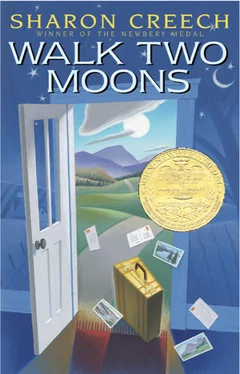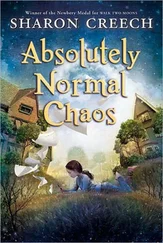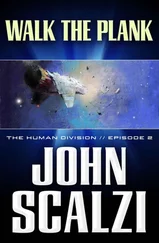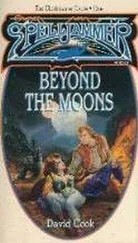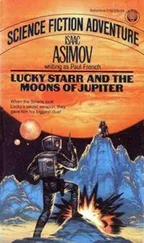Phoebe’s sister, Prudence, was seventeen years old, but she acted like her mother. She ate primly, she nodded politely, she smiled after everything she said.
It all seemed peculiar. They acted so thumpingly tidy and respectable .
After dinner, Phoebe walked me home. She said, “You wouldn’t think it to look at her, but Mrs. Cadaver is as strong as an ox.” Phoebe looked behind her, as if she expected someone to be following us. “I have seen her chop down trees and lug the remains clear across her backyard. Do you know what I think? I think maybe she killed Mr. Cadaver and chopped him up and buried him in the backyard.”
“Phoebe!” I said.
“Well, I’m just telling you what I think, that’s all.”
That night, as I lay in bed, I thought about Mrs. Cadaver, and I wanted to believe that she was capable of killing her husband and chopping him into pieces and burying him in the backyard.
And then I started thinking about the blackberries, and I remembered a time my mother and I walked around the rims of the fields and pastures in Bybanks, picking blackberries. We did not pick from the bottom of the vine or from the top. The ones at the bottom were for the rabbits, my mother said, and the ones at the top were for the birds. The ones at people-height were for people.
Lying in bed, remembering those blackberries, made me think of something else too. It was something that happened a couple years ago, on a morning when my mother slept late. It was that time she was pregnant. My father had already eaten breakfast, and he was out in the fields. On the table, my father had left a single flower in each of two juice glasses—a black-eyed susan in front of my place, and a white petunia in front of my mother’s.
When my mother came into the kitchen that day, she said, “Glory!” She bent her face toward each flower. “Let’s go find him.”
We climbed the hill to the barn, crawled between the fence wires, and crossed the field. My father was standing at the far end of the field, his back to us, hands on his hips, looking at a section of fence.
My mother slowed down when she saw him. I was right behind her. It looked as if she wanted to creep up and surprise him, so I was quiet too and cautious in my steps. I could hardly keep from giggling. It seemed so daring to be sneaking up on my father, and I was sure my mother was going to throw her arms around him and kiss him and hug him and tell him how much she loved the flower on the kitchen table. My mother always loved anything that normally grows or lives out of doors— anything —lizards, trees, cows, caterpillars, birds, flowers, crickets, toads, ants, pigs.
Just before we reached my father, he turned around. This startled my mother and threw her off guard. She stopped.
“Sugar—” he said.
My mother opened her mouth, and I was thinking, “Come on! Throw your arms around him! Tell him!” But before she could speak, my father pointed to the fence and said, “Look at that. A morning’s work.” He indicated a new length of wire strung between two new posts. There was sweat on his face and arms.
And then I saw that my mother was crying. My father saw it too. “What—” he said.
“Oh, you’re too good , John,” she said. “You’re too good. All you Hiddles are too good. I’ll never be so good. I’ll never be able to think of all the things—”
My father looked down at me. “The flowers,” I said.
“Oh.” He put his sweaty arms around her, but she was still crying and it wasn’t what I had imagined it would be. It was all sad instead of happy.
The next morning when I went into the kitchen, my father was standing beside the table looking at two small dishes of blackberries—still shiny and wet with dew—one dish at his place and one at mine. “Thanks,” I said.
“No, it wasn’t me,” he said. “It was your mother.”
Just then, she came in from the back porch. My father put his arms around her and they smooched and it was all tremendously romantic, and I started to turn away, but my mother caught my arm. She pulled me to her and said to me—though it was meant for my father, I think—“See? I’m almost as good as your father!” She said it in a shy way, laughing a little. I felt betrayed, but I didn’t know why.
It is surprising all the things you remember just by eating a blackberry pie.
“Well, lookee here!” Gramps shouted. “The Illinois state line!” He pronounced Illinois “Ill-ah-no-way,” exactly the way everyone in Bybanks, Kentucky, pronounced it, and hearing that “Ill-ah-no-way” made me suddenly homesick for Bybanks.
“What happened to Indiana?” Gram said.
“Why, you gooseberry,” Gramps said. “That’s where we’ve been the past three hours, barreling through Indiana. You’ve been listening to the story of Peeby and plumb missed Indiana. Don’t you remember Elkhart? We ate lunch in Elkhart. Don’t you remember South Bend? You took a pee in South Bend. Why, you missed the entire Hoosier state! You gooseberry.” He thought this was very funny.
Just then, the road curved (it actually curved —this was a shock), and off to the right was a huge jing-bang mass of water. It was as blue as the blue-bells that grow behind the barn in Bybanks, and that water just went on and on—it was all you could see. It looked like a huge blue pasture of water.
“Are we at the ocean?” Gram asked. “We’re not supposed to be passing the ocean, are we?”
“You gooseberry, that’s Lake Michigan.” Gramps kissed his finger and put it against Gram’s cheek.
“I sure would like to put my feet in that water,” Gram said.
Gramps swerved across two lanes of traffic and onto the exit ramp, and faster than you could milk a cow we were standing barefoot in the cool water of Lake Michigan. The waves splashed up on our clothes, and the sea gulls flew in circles overhead, calling in one great chorus, as if they were glad to see us.
“Huzza, huzza!” Gram said, wriggling her heels into the sand. “Huzza, huzza!”
We stopped that night on the outskirts of Chicago. I looked around at what I could see of Ill-ah-no-way from the Howard Johnson Motel, and it might as well have been seven thousand miles from the lake. It all looked precisely like northern Ohio to me, with its flat land and long, straight roads, and I thought what a very long journey this was going to be. With the dark came the whispers: rush, hurry, rush.
That night I lay there trying to imagine Lewiston, Idaho, but my mind would not go forward to a place I had never been. Instead, I kept drifting back to Bybanks.
When my mother left for Lewiston, Idaho, that April, my first thoughts were, “How could she do that? How could she leave me?”
As the days went on, many things were harder and sadder, but some things were strangely easier. When my mother had been there, I was like a mirror. If she was happy, I was happy. If she was sad, I was sad. For the first few days after she left, I felt numb, non-feeling. I didn’t know how to feel. I would find myself looking around for her, to see what I might want to feel.
One day, about two weeks after she had left, I was standing against the fence watching a newborn calf wobble on its thin legs. It tripped and wobbled and swung its big head in my direction and gave me a sweet, loving look. “Oh!” I thought. “I am happy at this moment in time.” I was surprised that I knew this all by myself, without my mother there. And that night in bed, I did not cry. I said to myself, “Salamanca Tree Hiddle, you can be happy without her.” It seemed a mean thought and I was sorry for it, but it felt true.
Читать дальше
